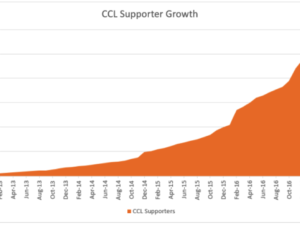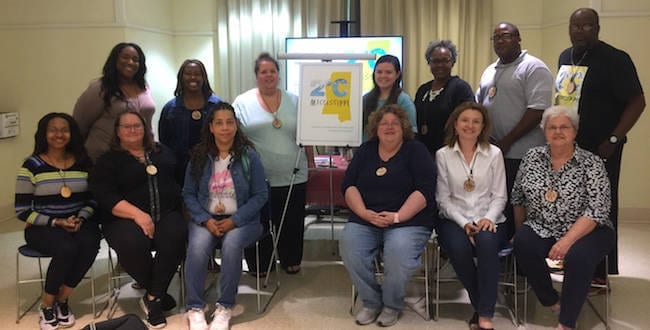
Dominika Parry (front row, second from right) is having success with climate advocacy in Mississippi, driven in part by her education program called 2C Mississippi.
Raising climate awareness in Mississippi
By Philip Finkelstein
In some parts of the country, like Massachusetts and California, CCL’s climate advocacy has been warmly embraced, with chapters quickly popping up and growing easily. As you might imagine, that hasn’t always been the case in the South. But when has a challenge ever stopped a CCLer?
Sure enough, Mississippi State Coordinator Dominika Parry has been finding success. Her story and her approach can serve to motivate and teach aspiring activists the power of creativity and persistence, especially in areas where climate advocacy isn’t an easy sell.
Dominika shared her story on a recent Emerging Group Leader call, and we’ve recapped it for you here.
Up to the challenge
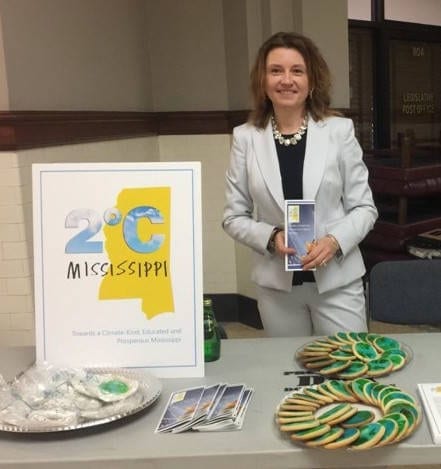
Dominika Parry
Dominika originally came to the United States over 20 years ago from Poland, living in several states before finally settling near Jackson, Mississippi. She had worked professionally on climate change her entire career in various settings, but nothing had prepared her for the challenges her new home would present. It came as a shock that her otherwise friendly and sweet neighbors were unaware of the effects of climate change or actively resistant to its existence and anthropogenic nature.
Afraid of creating a rift in the community, her initial thought was, “I’ll keep my professional work to myself.” This notion was short-lived as she quickly began to see the many ways climate change was affecting her state.
For two weeks, she looked for non-partisan organizations that were working on climate action. She knew that the only possible way to talk about climate change in Mississippi was to Republicans about market-based solutions, which brought CCL to the top of her list. With a Ph.D. in economics, she found CCL’s Carbon Fee and Dividend (CF&D) solution to be very rational.
At the time, CCL had yet to establish a chapter in Jackson because climate change was a taboo subject and people were worried about being ostracized, or even fired. So when it really came down to it, there was simply nobody else willing to do the job. She stepped up, and CCL was delighted to make her the first group leader in the state.
Bridging the divide with food and sharing
Dominika asked everyone she knew if they wanted to join CCL, which over time brought together a group of liberal-minded southerners—not representative of the population in Mississippi, but a good start. Given the unusual locale for climate discussion, group meetings evolved into social gatherings around food, allowing volunteers to relax, and as Dominika puts it, “vent” about the frustrations of being a climate activist in Mississippi. For a long time, the group was primarily only declared Democrats. Today, the venting has cooled off as several Republicans have joined the group, but the food element is still working very well, fostering an environment for social bonding beyond party lines.
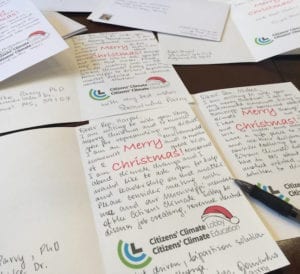
Sending Christmas cards to Congress
Organizing the group came with the usual growing pains. To get her chapter involved, she learned that setting up short, easy tasks is rewarding and inspires a sense of purpose among the volunteers. It may have taken two years for others to assume more responsibility, but eventually a new member accepted the role of co-leading the group, which Dominika says has helped tremendously in moving forward with a growing workload. Dominika encourages other group leaders to delegate enough work so that everyone feels they share in the responsibility.
Outreach through education
Organizational obstacles, however, pale in comparison to the very real challenge of subverting the status quo. Dominika describes the situation like being “permanently in front of a wall.” When lobbying in a state where senators don’t believe in climate change, let alone think it warrants policy-making, lobby meetings don’t feel as though they make much headway, if they even happen at all. As an alternative to outreach, Dominika found some luck writing op-eds and speaking at churches, but very little progress was being made with Republican leaders. The doors were simply shut to climate lobbyists. Then it dawned on her—she realized that outreach strategy has to account for context. In order to talk to those ignorant or unsympathetic to your cause, one must first focus on education. Hence, Dominika founded 2C Mississippi as an apolitical organization to educate Mississippians on the underlying science of climate change.
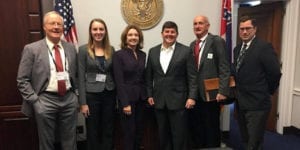
Meeting with Congressman Steven Palazzo, who represents Mississippi’s 4th district
This initiative became a huge breakthrough for outreach in Mississippi. She is now actively sought to speak at Rotary clubs and schools that had once closed their doors. It’s all about perception; according to Dominika, “People just don’t want to talk to someone perceived to be on the other side, politically.” 2C Mississippi has now successfully devised a middle school curriculum including climate science without touching on social science aspects, which is being piloted in public schools. This success has led to the Department of Education wanting to support her efforts and has opened up a network of relationships for greater outreach.
Largely thanks to Dominika’s dedication, Mississippi is now home to five additional CCL chapters: Millsaps College, Gulf Coast, Southaven, Hattiesburg, and University of Southern Mississippi. All of these chapters are doing amazing work to help usher in a new age of climate advocacy in the South. CCL is a grassroots organization, and Dominika and her fellow Mississippians are planting new seeds every day.


